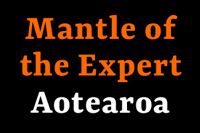Secondary cluster Skype meeting
On 16th August 2012 7pm – 8pm we have the next in our regular secondary skype
conversations (for secondary teachers using MOTE).
On the agenda: Role based assessment tools, Ideas for Drama NZ conference, Feedback from UK / Eire conferences.
Please email Viv viva@waikato.ac.nz (or use comment button below) if you wish to be included in the skype conversation or if you have any further ideas for discussion.

Kia ora tatou
What a rich hour Viv Aitkin, Gaenor Stoate, and I shared on Thursday night during our skype conversation on using MOTE in secondary classrooms.
Here’s a bit of a recap for those who are interested:
After brief introductions (as this was my first time participating), Gaenor shared some of the themes, ideas and questions informing her Master’s research, such as: how can drama teachers can encourage students to engage in high-risk work? And how might the devising standard be approached through a MOTE lens, such as where the students devise a piece of theatre in role as a professional theatre company?
This provoked discussion about Mantle’s “Commission Model”, i.e. the notion of moving through the enterprise-building phase quite quickly so that the students spend the majority of time working on and completing the actual ‘commission’ (which in senior classes is invariably the requirements of the NCEA standard). By doing this, Gaenor explained how potently MOTE could be used to drive the work in secondary drama classes.
This led us to brainstorm possible MOTE frames we could use teach Greek Theatre.
We talked about how much time to spend as a teacher ‘building belief’ before getting on with the actual commission. This led Viv to share about her use of creating a “portal” as a tool that enables students to both build belief and create an identity. We then talked about the role the “portal” could play in stage design as well as a ritual for moving in and out of role.
Viv then offered some insight into her understanding of the difference between an “integration approach” to education and an “incorporation approach”. Whereas the former implicitly understands school subjects as distinctive elements that can be brought together, the latter views subjects as inherently conjoined.
Overall, a wonderful range of theoretical ideas and practical tools discussed!
Our next secondary cluster skype meeting will take place on Thursday, October 25, 7-8pm.
Nga mihi nui
Kineret
Hi Viv – can you explain what is meant by using a ‘portal’
Ta
Viv
Hi viv – great question!
What we were talking about here was the idea of spending time with the students creating the company’s entrance way… ie deciding what the doorway to the fictional offices where we work might look like. Not essential to do this – but can be useful because we can make decisions about what kind of place we work in, and what our space ‘says’ to customers as they step in. This can be really helpful to build belief before starting the experiential phase of the drama.
It’s a ‘portal’ in as much as when we finally step through it, we symbolically enter the fictional world of the enterprise… If time is spent actually ‘signing’ the door (e.g. representing it on big sheets of brown paper) then these can be fixed around the door of the classroom and become something the students pass through each day. This notion of ‘passing through’ or ‘stepping over’ into the fictional world can really help to keep everyone clear about the fictional aspect…
Does this clarify things a litte?
I don’t claim to have invented this convention. It was something that I read about somewhere (but can’t give you the reference for right now)… I know that Priya at Muritai makes alot of use of the ‘portal’ idea, and I’ve done so a number of times in the past. Check out the blogs on the right for some examples….